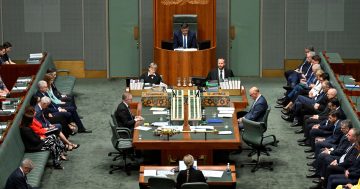
Comcare acting chief executive Aaron Hughes said a code of conduct for parliamentarians and their staff, along with sanctions, should be supported by thorough training. Photo: Region.
MPs and senators have sole discretion to deal with electorate officers working for them under the Members of Parliament Act, making it extremely difficult for Commonwealth departments to ensure the safety of workers in Parliament House.
As it stands, the act gives parliamentarians complete power to demand unreasonable staff workloads, dismiss complaints of bullying and harassment, and terminate their employment at will.
This point was a significant focus of evidence at public hearings of the Joint Select Committee on Parliamentary Standards, held in Canberra this week.
The committee was formed as a result of the Jenkins Review and is tasked with crafting a code of conduct for parliamentarians and their staff.
On Tuesday (20 September), the committee was told that the two departments most closely involved in supporting the functioning of Parliament are the Department of Finance and the Department of Parliamentary Services. But in its submission to the committee, the government’s workplace safety regulator Comcare noted that the role of those departments, particularly Finance, which is not headquartered in Parliament House, was constrained by the restrictions of the act.
Comcare observes that the current Determination issued by the Special Minister of State under the MOP(S) Act states that: “Electorate Officers work under the sole direction of the employing Senator or Member.” This may limit the capacity of the Department of Finance to instruct workers and implement safety arrangements in these workplaces,” it states.
“Comcare notes the MOP(S) Workplace Bullying and Harassment Policy Issues Resolution Procedure states that the Department of Finance has no capacity to take disciplinary action against either a parliamentarian or MOP(S) Act employee where a complaint is substantiated. Where a complaint against an employee is substantiated, the parliamentarian decides the appropriate management action.
“Comcare has identified barriers to the Department of Finance being able to monitor or seek compliance with its policies and procedures for parliamentary workplaces. Comcare has responded to incidents reported by the Department of Finance where the Department expressed concerns about its ability to ensure the health and safety of MOP(S) Act workers in parliamentary workplaces.”
In his evidence to the committee, Comcare acting chief executive Aaron Hughes said a code of conduct for parliamentarians and their staff, along with sanctions that go to this issue, should be supported by thorough training.
“Any code of conduct needs to be compliant with the law and consistent with the Work Health and Safety Act … and needs to be based on consultation and collaboration,” he said.
In its evidence to the hearings, the Department of Employment and Workplace Relations said overseas examples of parliamentary workplace codes of conduct and their enforcement should be noted in Australia.
“Certainly we’re aware … of what the UK is doing,” assistant secretary Adrian Breen said.
“They have very clear guidelines in terms of the treatment of others and clear arrangements about respect.”
Committee chair Labor MP Sharon Claydon also noted that the Canadian model made compliance with its code of conduct a condition of employment contracts, with serious consequences for infringement.
Community and Public Sector Union secretary Melissa Donnelly cautioned against any new code of conduct being manipulated to work against staff and in favour of MPs looking for scapegoats.
“It would be a perverse outcome, and not consistent with the recommendations of the Jenkins Review, for staff to be held to higher accountability than their parliamentarian employers,” she said.
“This is a unique opportunity to significantly improve the standards and culture in the parliamentary workplace.”
Deputy chair Liberal Senator Marise Payne agreed that it would be inappropriate if staff found themselves with a different layer of accountability and enforcement due to a new code of conduct.
“I must say that in my time as a parliamentarian, I have never seen a staff member held responsible for an action they took at the request of their parliamentarian employer,” she said.
“Nor would that be appropriate.”
Submissions can still be made to the Joint Select Committee on Parliamentary Standards.




















